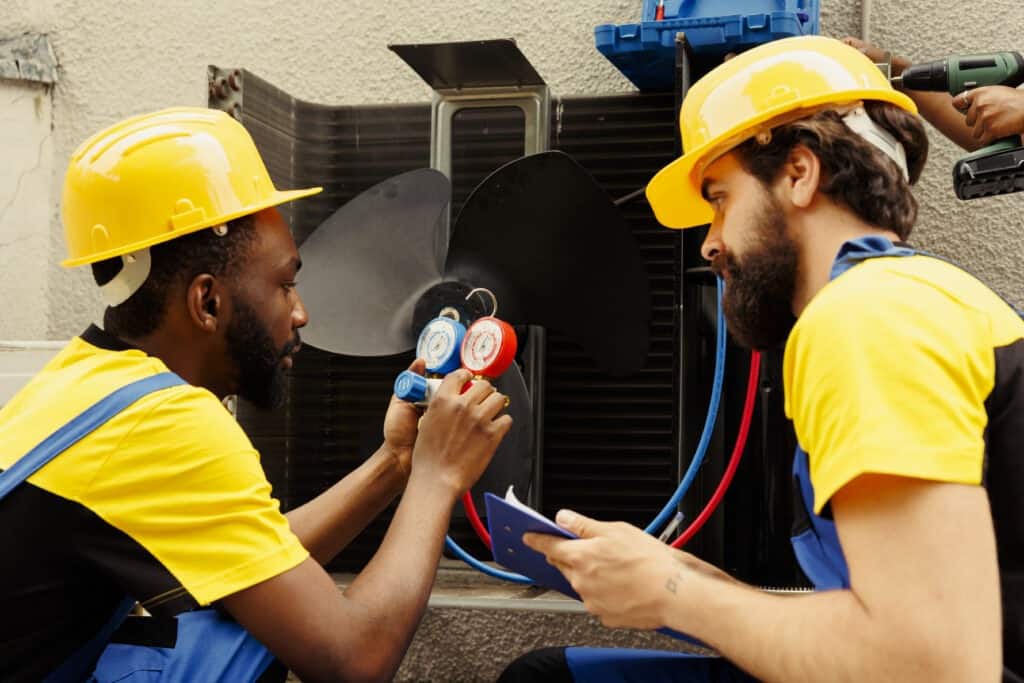Coils are an important component of HVAC systems, and play a crucial role in maintaining indoor comfort. Understanding their importance, types, materials, and maintenance requirements is essential for ensuring the smooth and efficient operation of your HVAC system. In this blog of All Seasons Home HVAC – your trusted source for all things related to heating, ventilation, and air conditioning we delve into a crucial component of HVAC systems – coils and its significance for ensuring the efficient and smooth operation of your HVAC system.
What Are Coils?
Coils are integral components of HVAC systems responsible for heat transfer. They come in two main types: evaporator coils – located indoors, and condenser coils – situated outdoors. Both types play a crucial role in the heat exchange process that allows HVAC systems to cool or heat indoor spaces effectively.
Functions and Significance of Coils
1. Heat Absorption and Release: Evaporator coils absorb heat from indoor air, while condenser coils release it outside, enabling the cooling process.
2. Heat Exchange: Coils facilitate the transfer of heat between the refrigerant and the air, ensuring efficient temperature regulation.
3. Efficiency Boost: Well-maintained coils contribute to the overall efficiency of the HVAC system, reducing energy consumption and costs.
Different Types of Coils
In the HVAC systems, coils play a pivotal role in the heat exchange process, facilitating the transfer of heat to achieve desired indoor temperatures. Two primary types of coils are crucial to this process: evaporator coils and condenser coils. Let’s explore these two types in detail.
1. Evaporator Coils
Function:
Evaporator coils are located indoors, typically within the air handler unit or furnace. Their primary function is to absorb heat from indoor air, cooling it down before circulating it back into the living space. This process is vital for maintaining a comfortable indoor environment during hot weather.
Construction:
Evaporator coils are typically made of copper due to its excellent heat transfer properties. The coils are arranged in a serpentine pattern to maximize the surface area available for heat exchange. As warm air passes over the coils, the refrigerant inside absorbs heat, causing it to evaporate and transform into a low-pressure gas.
Importance:
Evaporator coils are critical components of the cooling cycle. They enable the refrigerant to absorb heat from indoor air, allowing the HVAC system to regulate indoor temperatures effectively. Proper functioning of the evaporator coils is essential for efficient cooling performance.
Issues:
Over time, evaporator coils can become dirty or develop leaks, affecting their ability to absorb heat efficiently. Dirt and debris accumulation can insulate the coils, reducing their heat exchange capacity. Leaks can lead to a loss of refrigerant, impacting the cooling capacity of the system.
2. Condenser Coils
Function:
Condenser coils are located in the outdoor unit of an HVAC system. Their primary function is to release the heat absorbed from indoor air into the outdoor environment. This process allows the refrigerant to release heat and return to a liquid state, ready to absorb more heat from indoor air.
Construction:
Condenser coils are also commonly made of copper or aluminum. Like evaporator coils, they are designed to maximize surface area for heat exchange. As the high-pressure refrigerant gas flows through the coils, it releases heat to the surrounding air, causing it to condense back into a liquid state.
Importance:
Condenser coils play a crucial role in the heat dissipation process. By releasing heat outdoors, they allow the refrigerant to complete its cycle and prepare for another round of heat absorption. Proper functioning of condenser coils is essential for maintaining the efficiency of the entire HVAC system.
Issues:
Similar to evaporator coils, condenser coils can also suffer from dirt and debris buildup, reducing their heating capacity. Additionally, outdoor environmental factors such as leaves, grass clippings, and debris can obstruct airflow around the coils, further reducing their effectiveness.
In nutshell, evaporator and condenser coils are integral components of HVAC systems, working together to regulate indoor temperatures effectively. Proper maintenance and regular cleaning of these coils are essential for ensuring the efficiency and longevity of your HVAC system. If you encounter any issues with your HVAC coils, it’s best to consult with a professional HVAC technician for proper diagnosis and repair.
Materials Used in Coil Construction
1. Copper: Known for its high thermal conductivity and durability, copper is a common choice for coil construction.
2. Aluminum: Lightweight and corrosion-resistant, aluminum is another popular material for coil manufacturing.
3. Steel: While less common, steel coils are used in specific applications where corrosion resistance and durability are paramount.
Effects of Coil Malfunctioning
1. Increased Energy Bills: Inefficient coils can result in higher energy consumption, leading to increased utility costs.
2. Comfort Issues: Malfunctioning coils may struggle to maintain desired indoor temperatures, leading to discomfort for occupants.
3. System Breakdown: Severe coil issues can ultimately lead to system breakdowns, requiring immediate attention and repairs.
Precautions, Maintenance, and Solutions
There are several precautions HVAC owners must take to maintain their system’s coils:
1. Regular Maintenance: Schedule regular maintenance to clean coils, check for leaks, and ensure proper airflow.
2. Coil Cleaning: Clean coils periodically to remove dirt, dust, and debris that can hinder heat exchange.
3. Refrigerant Level Checks: Ensure proper refrigerant levels to prevent coil freezing and damage.
4. Professional Inspections: Periodically enlist the services of HVAC professionals to inspect coils for any issues and ensure optimal performance.
5. Coil Protection: Consider installing coil guards or covers to protect coils from physical damage and debris buildup.
6. Timely Repairs: Address any coil issues promptly to prevent further damage and maintain system efficiency.
Looking for Professional Help?
Coils play a pivotal role in the heat exchange process of HVAC systems, facilitating the transfer of heat to achieve desired indoor temperatures. Both the evaporator coils and condenser coils are crucial for this process that’s why coils are considered as important components of HVAC systems.
Are your HVAC coils in need of maintenance or repair? Contact All Seasons Home HVAC for professional coil inspection, cleaning, and maintenance services. Our experienced technicians will ensure your coils are in top condition, maximizing the efficiency and longevity of your HVAC system. Schedule a consultation to keep your HVAC system running smoothly!




